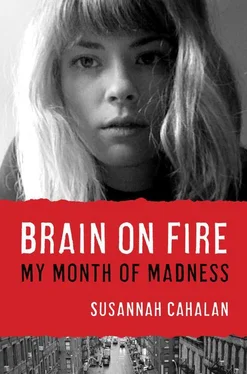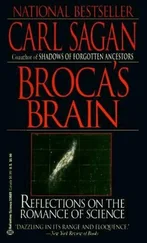“Here,” she said, handing my dad a crumpled paper with illegible numbers scrawled across it. “Call me and I’ll explain.”
My dad politely put the number in his pocket, but he knew better than to call her. He pushed open the door to my new room, accidentally hitting the security guard whose chair had been propped up against it.
The new room was surprisingly peaceful, with a bank of windows looking out onto the East River and FDR Drive. Barges slipped silently by on their trips downriver. My father was pleased by the change, since he’d grown convinced that the AMU room with its monitors, nursing station, and the constant activity of the three other patients had heightened my anxiety.
When I finally awoke, I saw him and smiled. It was the first time that I had greeted him with warmth since that unspeakable night at his house, the evening before I was admitted. Heartened by my new attitude, he proposed a walk around the floor to keep me active.
Though I readily agreed to the walk, it wasn’t easy to do. I maneuvered my body like an elderly person, stiffly easing myself toward the edge of the bed before dangling my feet over the side. My dad slid a fresh pair of nonskid, moss-colored socks over my feet and helped me off the bed. He noticed I had no electrodes on my head, but as it turned out this was just because I had removed them again during another overnight escape attempt, and the staff hadn’t yet been able to replace them.
Even walking itself was no longer a simple task for me. My dad had always been a fast walker (when James and I were little, he often barreled ahead of us down crowded city streets), but now he was careful to stay by my side, guiding me as each leg jutted out and landed awkwardly, as if I was learning how to walk all over again. He couldn’t help but drop the cheerful facade when he saw my slow movements. When we got back to my room, he suggested a motto to keep my mind on the silver lining.
“What is the slope of the line?” he asked.
I looked at him in silence.
“It’s positive,” he said with forced optimism, angling his arm upward to show a slope. “And what does positive mean?”
Another blank look.
“It means we make progress every day.”
I was deteriorating physically, but at least my psychosis had receded, clearing the way for the doctors to finally schedule more tests. Whatever I suffered from seemed to ebb and flow, minute to minute, hour to hour. Still, the hospital staff jumped on this seeming progress and proceeded with a lumbar puncture, more commonly known as a spinal tap, which would give them access to the clear, saltwater-like cerebrospinal fluid that bathes the brain and spinal cord. The test had been too dangerous to conduct before because a lumbar puncture requires full cooperation from the patient to remain steadfastly still. Sudden movement can mean horrendous risks, including paralysis and even death.
Although my dad understood that the lumbar puncture was a necessary next step, the thought of the procedure still terrified him and my mom. When James was an infant, he had suffered from a dangerously high fever that had required a spinal tap to rule out meningitis, and my parents had never forgotten the baby’s shrill, anguished screams.
The next day, March 27, was my fifth in the hospital but only the second time I had allowed my dad into my room. Most of the time I stared off into space, without any visible display of emotion, my psychosis now completely replaced by passivity. Still, these remote spells were sometimes punctuated by a few passionate pleas for help. In my few seemingly lucid moments (which are, like the rest of this time, still foggy or entirely blank in my own recollection), my dad felt as if some primal part of me was reaching out to him as I repeated over and over, “I’m dying in here. This place is killing me. Please let me leave.” These invocations deeply pained my father. He desperately wanted me out of this soul-sucking situation, but he knew there was no other option than to stay.
Meanwhile, my mom, who had visited me that morning but had had to return to work downtown in the afternoon, worried from afar, checking in with my father periodically to get updates about the procedure. She hid her desperation from her coworkers, focusing instead on her heavy workload, but her thoughts kept circling around me. She tried unsuccessfully to concentrate on getting through the workday, telling herself over and over that she shouldn’t feel guilty and that my father was looking after me.
Eventually, a young male orderly arrived to collect me for my spinal tap, calmly helping me from the bed into the wheelchair and motioning for my dad to follow. After they elbowed their way onto a cramped elevator, the orderly tried to make small talk.
“How are you two related?” he asked.
“I’m her father.”
“Is she epileptic?”
My dad bristled. “No.”
“Oh. I was just asking because I’m epileptic…,” the orderly said, trailing off apologetically.
He wheeled me from one elevator bank to another across the stadium-sized entranceway and finally into a holding pen that also housed five other gurneys, each with its own orderly and patient. My dad angled his body in front of my line of vision so that I would not be tempted to compare my own fate with those around me. She is not one of these people, he repeated endlessly to himself, until the nurse called me in alone. He knew I was just getting a spinal tap, but he couldn’t help his mind wandering to more sinister scenarios. It was that kind of place.
CHAPTER 21
DEATH WITH INTERRUPTIONS
Nearly a week had gone by since I was admitted, but inside the hospital it was as if time didn’t exist. Stephen likened the atmosphere to Atlantic City, with beeping blood pressure monitors instead of slot machines and sad, sick patients instead of sad, sick gamblers. Like a casino, there were no clocks or calendars. It was a stabilized, static environment; the only thing that punctuated the time was the endless activity of the nurses and doctors. From what my family could tell, I had developed an affection for two of the nurses: Edward and Adeline. Nurse Edward, a burly guy with a warm smile, was the only man on a floor of all female nurses, and because of this, he was often mistaken for a doctor. He took it in stride, maintaining an extraordinarily cheery disposition, and joked with me about the Yankees and the New York Post, his favorite newspaper. By contrast, Nurse Adeline, a middle-aged Filipino woman, was tigerishly efficient, a straight shooter who offered a healthy dose of discipline. Apparently she had a calming effect on me.
By now, my family had developed a routine. Now that I was again comfortable in his presence, my father would arrive in the morning, feed me a breakfast of yogurt and cappuccino, and play a few games of cards that I was often too disoriented to follow. Then he’d read aloud a book or magazine or just sit beside me quietly reading James Joyce’s Portrait of the Artist as a Young Man . Every day he brought homemade gourmet foods like my favorite dessert, strawberry rhubarb pie, although I would often hand over my father’s dishes to Stephen because I still was not eating regularly. My father had grown up watching his mother, an Irish nurse, whip up elaborate dishes in between ER shifts, and, like her, he unwound when he cooked. Not only did it help me through those hospital days, but it also helped him concentrate on something besides the bleakness.
My mother arrived during her lunch hour and after work to check on me, always keeping that trusty list of questions by her side. Often she stared out at the view of the East River, watching the boats pass the Long Island City PEPSI COLA sign, wringing her hands, a nervous habit, and losing herself in the view. Most days, we’d watch the Yankees play, and she would give me a rundown of what was happening with our favorite players. But mostly she sat beside me, making sure I was comfortable and, above all else, that the best doctors were visiting regularly.
Читать дальше













